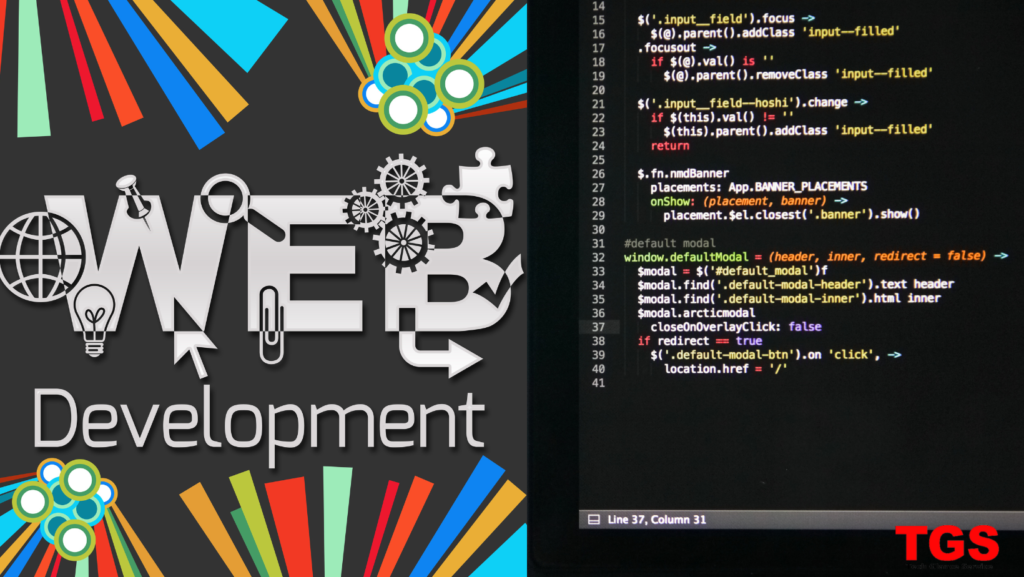What is Web Development?

Web development refers to the process of creating websites and web applications, which are accessed through the internet or an intranet. It involves a variety of tasks such as web design, web programming, database management, and server-side scripting, among others.
Web development can be divided into two broad categories: front-end development and back-end development. Front-end development involves creating the user interface and user experience of a website, including its visual design, layout, and functionality. Back-end development, on the other hand, involves the development of the server side of a website, which includes the database, server-side scripting, and the application’s logic.
Web development is an important field that is constantly evolving. With the increasing demand for web-based applications and online services, web development has become a crucial aspect of modern-day businesses and organizations. A web developer must have a strong understanding of programming languages such as HTML, CSS, and JavaScript, as well as frameworks and libraries such as React, Angular, and Vue.
What does Web Developer do?
A web developer is responsible for creating and maintaining websites and web applications. Their job typically involves a combination of front-end and back-end development tasks, depending on their area of specialization. Here are some common tasks that web developers typically perform:
- Web design: A web developer may be involved in the design process of a website, creating wireframes and mockups, and deciding on the layout and visual design of the site.
- Front-end development: This involves writing code for the client side of a website or web application, which includes HTML, CSS, and JavaScript. Front-end developers are responsible for ensuring that the website looks good and functions properly on different devices and platforms.
- Back-end development: This involves writing code for the server side of a website or web application, which includes server-side scripting, database management, and server configuration.
- Testing and debugging: Web developers test and debug their code to ensure that the website is functioning properly and is free from errors or bugs.
- Maintenance and updates: Web developers are responsible for maintaining and updating websites, ensuring that they are up-to-date with the latest security patches and software updates.
- Collaboration and communication: Web developers may work with other developers, designers, or stakeholders in a project, and are expected to communicate effectively and work collaboratively to deliver the project.
Overall, a web developer’s role is to ensure that a website or web application is functional, user-friendly, and meets the needs of its users and stakeholders.
Which language mostly prefer by Web Developers?
There are several programming languages and technologies that are commonly used by web developers, depending on the specific task and area of specialization. Here are some of the most commonly used languages and technologies:
- HTML (Hypertext Markup Language): HTML is the standard markup language used to create the structure and content of web pages.
- CSS (Cascading Style Sheets): CSS is used to add style, layout, and visual design to web pages, including fonts, colors, and other visual elements.
- JavaScript: JavaScript is a scripting language that is used to create interactive and dynamic web pages, including animations, forms, and other user interface elements.
- PHP (Hypertext Preprocessor): PHP is a server-side scripting language that is used to create dynamic web pages, such as e-commerce websites or content management systems.
- Python: Python is a versatile programming language that is used for both front-end and back-end development, and is often used for web development frameworks such as Django or Flask.
- Ruby: Ruby is another versatile programming language that is commonly used for web development frameworks such as Ruby on Rails.
- SQL (Structured Query Language): SQL is used to manage and manipulate databases, which are often used for web applications that require data storage.
In addition to these languages and technologies, there are also many frameworks and libraries that are commonly used by web developers, such as React, Angular, Vue, and jQuery, among others.
How to become a Web Developer?
Becoming a web developer requires a combination of education, training, and practical experience. Here are some steps you can take to become a web developer:
- Learn the basics of HTML, CSS, and JavaScript: These are the foundational languages of web development. There are many online resources, tutorials, and courses available that can help you get started.
- Choose a specialization: There are many areas of specialization within web development, including front-end development, back-end development, full-stack development, and more. Choose an area of specialization that aligns with your interests and career goals.
- Take formal courses or obtain a degree: A degree in computer science or a related field can be helpful in establishing your skills and knowledge as a web developer. Alternatively, you can take online courses or attend coding boot camps to gain practical experience and learn new skills.
- Build a portfolio: Create a portfolio of your work, including projects that demonstrate your skills and expertise in web development. This can help you showcase your abilities to potential employers or clients.
- Participate in online communities: Join online communities and forums related to web development, such as GitHub, Stack Overflow, and Reddit. This can help you connect with other developers, learn new skills, and stay up-to-date on industry trends.
- Seek out internships or freelance work: Look for internships or freelance opportunities that can provide you with real-world experience and help you build your skills and portfolio.
- Continuously learn and improve: The field of web development is constantly evolving, so it’s important to stay up-to-date on the latest trends and technologies and continue to learn and improve your skills throughout your career.
Becoming a web developer takes time and effort, but with dedication and hard work, you can build a successful career in this exciting and rewarding field.
What are the courses for Web Development?

There are many courses available for web development, both online and offline, ranging from beginner to advanced levels. Here are some of the most popular courses for web development:
- HTML and CSS: These courses teach the basics of HTML and CSS, which are the foundational languages of web development.
- JavaScript: These courses teach the fundamentals of JavaScript, which is used to create dynamic and interactive web pages.
- Responsive Web Design: These courses teach how to create websites that are optimized for all screen sizes and devices, using techniques such as fluid grids, flexible images, and media queries.
- Front-end Frameworks: These courses teach how to use popular front-end frameworks such as React, Angular, or Vue to create complex and scalable web applications.
- Back-end Development: These courses teach how to use server-side languages such as PHP, Python, Ruby, or Node.js to create and manage databases, server-side scripting, and other back-end functionality.
- Full-Stack Development: These courses teach how to use both front-end and back-end technologies to create a complete web application from start to finish.
- Content Management Systems: These courses teach how to use popular CMS platforms such as WordPress, Drupal, or Joomla to create and manage website content.
- E-commerce Development: These courses teach how to create online stores and e-commerce websites using shopping cart software, payment gateway integration, and inventory management systems.
There are many online platforms that offer web development courses, such as Udemy, Coursera, edX, Codecademy, and Treehouse, among others. Additionally, many universities and colleges offer web development courses as part of their computer science or IT programs.
What are the different types of Web Development?
There are several different types of web development, each with its own set of skills, tools, and technologies. Here are some of the most common types of web development:
- Front-end development: This type of web development focuses on the user interface and the client side of a website or web application. Front-end developers use languages such as HTML, CSS, and JavaScript to create the visual design and functionality of a website or web application.
- Back-end development: This type of web development focuses on the server side of a website or web application. Back-end developers use languages such as PHP, Python, Ruby, or Node.js to create and manage databases, server-side scripting, and other backend functionality.
- Full-stack development: This type of web development involves both front-end and back-end development, and requires knowledge and skills in both areas. Full-stack developers are responsible for creating and managing the entire web development process, from design to deployment.
- Mobile development: This type of web development focuses on creating websites or web applications that are optimized for mobile devices, such as smartphones and tablets. Mobile developers use technologies such as responsive design, mobile-specific frameworks, and native mobile app development tools.
- E-commerce development: This type of web development focuses on creating online stores and e-commerce websites. E-commerce developers use technologies such as shopping cart software, payment gateway integration, and inventory management systems.
- Content management system (CMS) development: This type of web development focuses on creating custom content management systems, such as WordPress or Drupal, that allow users to easily create and manage website content.
Overall, there are many different types of web development, each requiring specific skills and knowledge. As a web developer, you can specialize in one or more areas of web development depending on your interests and career goals.
What is the salary of a Web developer?
The salary of a web developer can vary depending on factors such as location, experience, skills, and the specific industry or company they work for. Here are some estimates of the average salary for web developers in different regions:
- United States: According to the Bureau of Labor Statistics, the median annual wage for web developers in the United States was $77,200 as of May 2020.
- United Kingdom: According to PayScale, the average salary for a web developer in the United Kingdom is £29,000 to £42,000 per year, depending on experience and skills.
- Canada: According to the Government of Canada Job Bank, the median salary for web developers in Canada is $66,000 per year.
- Australia: According to Seek, the average salary for a web developer in Australia is AU$ 75,000 to AU$ 95,000 per year.
It is important to note that these are general estimates, and actual salaries can vary widely depending on the factors mentioned above. Additionally, specialized skills such as mobile app development, e-commerce development, or full-stack development can command higher salaries.


